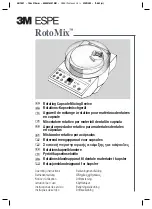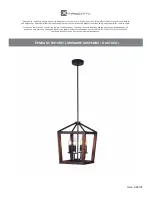
P a g e
2
I.L. 5229B79H05
Effective 06/2014
Figure 2 Device shown with upper terminals grounded
Figure 3 Device shown with lower terminals grounded
compartment, the opposite normally holds true, i.e., the
top terminals connect to the incoming line or feeders
and the bottom terminals connect to the main bus. This
must be verified for each application. Because of this
two-high arrangement, the bus and the line positions of
the grounding and test device terminals will vary
depending upon whether the device is used in an
upper or lower compartment. Therefore,
it is most
important that the bus or line terminals be correctly
identified for each compartment before using this
device.
1-3 OPERATION
1-3.1 SAFE PRACTICES
WARNING
A GROUND AND TEST DEVICE IS A SAFETY-
RELATED DEVICE. IT MUST BE RECOGNIZED
THAT IMPROPER USE CAN RESULT IN DEATH,
SERIOUS PERSONAL INJURY, OR PROPERTY
DAMAGE. THAT IS WHY IT IS MOST IMPORTANT
THAT THE USER DEVELOP SPECIFIC AND SAFE
OPERATING PROCEDURES FOR ITS USE.
The following general safe practices are recommended:
Store the device in a clean, dry area free from
dust, dirt, moisture, etc.
Keep all insulating surfaces, which include pri-
mary support insulation barriers, clean and dry.
Check all primary circuit connections to make
certain that they are clean and tight.
Permit only authorized trained personnel to use
this device.
TAKE EXTREME CARE WHILE USING THIS
DEVICE TO AVOID
CONTACTING “LIVE” OR
“HOT” (ENERGIZED) TERMINALS.
CORRECTLY IDENTIFY LINE AND BUS TER-
MINALS FOR THE BREAKER COMPART-
MENT BEFORE USING THIS DEVICE.
Check for correct code plate(s) on the device.
Do not attempt to force the device into the com-
partment.
The grounding of either upper or lower terminals is
accomplished by connecting grounding links (provided
with the device) from either the upper or the lower
terminals to the device ground connection. Cable
testing or “phasing out” testing may be accomplished
by connecting suitable test equipment, as required to
the terminals.






















